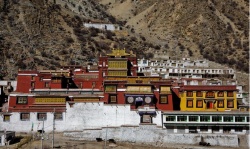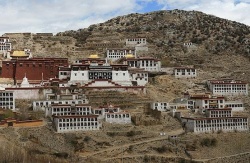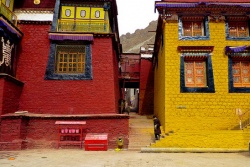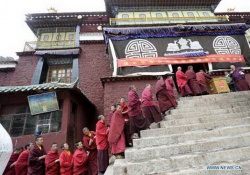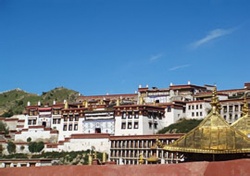Difference between revisions of "Tsurphu Monastery"
| Line 24: | Line 24: | ||
They now have been requested to undertake the making of the two large {{Wiki|ceremonial}} {{Wiki|silk}} appliqué lace like banners for display in the main assembly hall at [[Tsurphu]]. These are the companion pieces of the two Giant [[Appliqué]] [[Thangkas]] completed in 1997, and are to be used in the main assembly hall for the {{Wiki|ceremonial}} aspect of the both festivals. | They now have been requested to undertake the making of the two large {{Wiki|ceremonial}} {{Wiki|silk}} appliqué lace like banners for display in the main assembly hall at [[Tsurphu]]. These are the companion pieces of the two Giant [[Appliqué]] [[Thangkas]] completed in 1997, and are to be used in the main assembly hall for the {{Wiki|ceremonial}} aspect of the both festivals. | ||
| − | Unlike the 2 giant [[thangkas]] these 2 Drawa Drachey appliqués were not destroyed, but taken to [[Sikkim]] by the [[16th Karmapa]] [[Rigpe Dorje]] in 1959, and are now at [[Rumtek Monastery]], [[India]]. These are to be copied for [[Tsurphu]] at the request of [[His Holiness]] [[Karmapa]], Ven. [[Drupon Dechen Rinpoche]] (the late the [[abbot]] of [[Tsurphu]]), and [[Tsurphu Gompa]]. | + | Unlike the 2 giant [[thangkas]] these 2 [[Drawa Drachey]] appliqués were not destroyed, but taken to [[Sikkim]] by the [[16th Karmapa]] [[Rigpe Dorje]] in 1959, and are now at [[Rumtek Monastery]], [[India]]. These are to be copied for [[Tsurphu]] at the request of [[His Holiness]] [[Karmapa]], Ven. [[Drupon Dechen Rinpoche]] (the late the [[abbot]] of [[Tsurphu]]), and [[Tsurphu Gompa]]. |
These two hangings called [[dra. wa. dap. che]], (pronounced [[drawa drachey]]) one is [[peaceful]] ([[Tsechur Drachey]]) and one is [[wrathful]] ([[Norbu Drachey]]), each [[measuring]] 2 mts x 40 mt, (approximately 7’ x 120’) will be used during [[Saga Dawa]] and [[Losar]] festivals annually. This will complete [[Tsurphu's]] [[precious]] appliqué [[relics]] lost during the {{Wiki|Cultural Revolution}}. As with the past projects, the responsibilities of the {{Wiki|artists}} range from drawing the images, acquiring the materials, supervising the sewing work in [[Lhasa]], as well as fund raising. The same team of [[Tibetan]] women part of the [[White Conch Factory]] in [[Lhasa]], and the {{Wiki|artists}} are the work force. | These two hangings called [[dra. wa. dap. che]], (pronounced [[drawa drachey]]) one is [[peaceful]] ([[Tsechur Drachey]]) and one is [[wrathful]] ([[Norbu Drachey]]), each [[measuring]] 2 mts x 40 mt, (approximately 7’ x 120’) will be used during [[Saga Dawa]] and [[Losar]] festivals annually. This will complete [[Tsurphu's]] [[precious]] appliqué [[relics]] lost during the {{Wiki|Cultural Revolution}}. As with the past projects, the responsibilities of the {{Wiki|artists}} range from drawing the images, acquiring the materials, supervising the sewing work in [[Lhasa]], as well as fund raising. The same team of [[Tibetan]] women part of the [[White Conch Factory]] in [[Lhasa]], and the {{Wiki|artists}} are the work force. | ||
| Line 38: | Line 38: | ||
The [[Lotsar ( Gutor]] ) {{Wiki|celebrations}} are where the second Drachey ([[Norbu]]) is used to {{Wiki|purify}} the coming new year. [[Mahakala puja]] is performed, as well as the [[protector’s]] [[cham]] ([[lama dances]]). Again approximately 80 beautifully costumed dancers perform this [[ritual]] cleaning {{Wiki|ceremony}}. Dignitaries, nomads, local villagers and foreign guests attend both of these festivals. | The [[Lotsar ( Gutor]] ) {{Wiki|celebrations}} are where the second Drachey ([[Norbu]]) is used to {{Wiki|purify}} the coming new year. [[Mahakala puja]] is performed, as well as the [[protector’s]] [[cham]] ([[lama dances]]). Again approximately 80 beautifully costumed dancers perform this [[ritual]] cleaning {{Wiki|ceremony}}. Dignitaries, nomads, local villagers and foreign guests attend both of these festivals. | ||
| − | The [[Norbu]] | + | The [[Norbu Drachey]] sewing was begun in [[Lhasa]], June 2006, and was completed July 2007. Now the more complex [[Tsechur Drachey]] will be started. |
This piece is 7 ft x 120 ft or 2 mt x 40 mt. | This piece is 7 ft x 120 ft or 2 mt x 40 mt. | ||
Revision as of 08:23, 16 November 2013
Tsurphu Monastery (also Tolung Tsurpu / sTod lung mTshur phu) is a Tibetan Buddhist monastery which served as the traditional seat of the Karmapa. It is located in Gurum town (rgu rum / Gǔróng Xiàng 古荣乡) of Doilungdêqên County in the Tibet Autonomous Region of China, 70 km from Lhasa. The monastery is about 14,000 feet (4,300 m) above sea level. It was built in the middle of the valley facing south with high mountains surrounding the monastery complex.
Tsurphu is a 300-square-meter (3,200 sq ft) complex with walls up to 4 meters (13 ft) thick. The monastery or "gompa", the traditional seat of the Karmapa lamas, is about 28 km up the Dowo Lung Valley, on the north side of the river. The original walls of the main building were up to 4 meters thick and 300 meters square (area 90,000 square meters or 970,000 square feet). The monks' residences were on the eastern side.
History
Tsurphu was founded by the first Karmapa, Düsum Khyenpa (1110-1193) in 1159, after he visited the site and laid the foundation for an establishment of a seat there by making offerings to the local protectors, dharmapala and genius loci. In 1189 he revisited the site and founded his main seat there. The monastery grew to hold 1000 monks.
It was totally destroyed in 1966 during the Cultural Revolution and began to be rebuilt in 1980 by the 16th Karmapa, Rangjung Rigpe Dorje. Following the recognition of Ogyen Trinley Dorje (born 1985) by the Tai Situpa, His Holiness the Dalai Lama and the Chinese government, he was enthroned at Tsurphu and resided there until he escaped from Tibet to India in 2000
PHASE ONE
of the Tsurphu Drachey Projects (Norbu Drachey) is complete.
Tsurphu is now using it in important ceremonies July 2007.
PHASE TWO
the Tsechur Drachey Project fundraising now begins.
Your donation is very important for Tsurphu Gompa!
Between 1992-1997 Terris and Leslie Nguyen Temple created the two giant thangkas for Tsurphu Gompa H.H.Karmapa's main seat in Tibet established in 1187 by the 1st Karmapa Dusum Khyenpa.
For the last fourteen years they have been the artists to H.H. the Gyalwa Karmapa’s Tsurphu Monastery in Tibet.
They now have been requested to undertake the making of the two large ceremonial silk appliqué lace like banners for display in the main assembly hall at Tsurphu. These are the companion pieces of the two Giant Appliqué Thangkas completed in 1997, and are to be used in the main assembly hall for the ceremonial aspect of the both festivals.
Unlike the 2 giant thangkas these 2 Drawa Drachey appliqués were not destroyed, but taken to Sikkim by the 16th Karmapa Rigpe Dorje in 1959, and are now at Rumtek Monastery, India. These are to be copied for Tsurphu at the request of His Holiness Karmapa, Ven. Drupon Dechen Rinpoche (the late the abbot of Tsurphu), and Tsurphu Gompa.
These two hangings called dra. wa. dap. che, (pronounced drawa drachey) one is peaceful (Tsechur Drachey) and one is wrathful (Norbu Drachey), each measuring 2 mts x 40 mt, (approximately 7’ x 120’) will be used during Saga Dawa and Losar festivals annually. This will complete Tsurphu's precious appliqué relics lost during the Cultural Revolution. As with the past projects, the responsibilities of the artists range from drawing the images, acquiring the materials, supervising the sewing work in Lhasa, as well as fund raising. The same team of Tibetan women part of the White Conch Factory in Lhasa, and the artists are the work force.
Tsurphu Gompa is the original seat of all the Gyalwa Karmapas and the Karma Kagyu Lineage. They need this support and these pieces to continue their important work for the benefit of all beings.
PHASE ONE of the Tsurphu Drachey Projects (Norbu Drachey) is complete.
Tsurphu is now using it in important ceremonies July 2007.
The peaceful drachey (Tsechur) is associated with the Sagadawa festival. Celebrating the birth and enlightenment of the Buddha, and Guru Rinpoche, founder of Tibetan Buddhism. The Guru Senge Cham (Guru Rinpoche Lama dances), these traditional elaborately costumed dances are preformed by about 80 lamas, and take up a good part of the day. The Giant Karma Gadri Thangka is shown the following day.
PHASE TWO
The Lotsar ( Gutor ) celebrations are where the second Drachey (Norbu) is used to purify the coming new year. Mahakala puja is performed, as well as the protector’s cham (lama dances). Again approximately 80 beautifully costumed dancers perform this ritual cleaning ceremony. Dignitaries, nomads, local villagers and foreign guests attend both of these festivals.
The Norbu Drachey sewing was begun in Lhasa, June 2006, and was completed July 2007. Now the more complex Tsechur Drachey will be started.
This piece is 7 ft x 120 ft or 2 mt x 40 mt.
This project involves the same team of workers who completed the last 3 appliqués for Tsurphu monastery, the White Conch Factory, Lhasa, Tibet.
